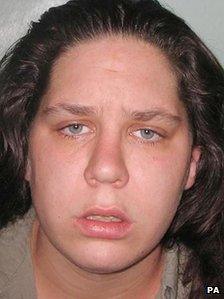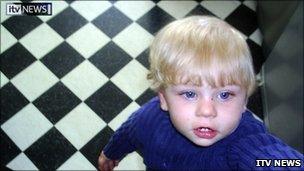Baby Peter mother 'can be released' says Parole Board
- Published

It was recommended Tracey Connelly serve a minimum of five years
The mother of Baby Peter, Tracey Connelly, should be released from jail, the Parole Board has said.
She was jailed indefinitely, with a recommended minimum term of five years, in May 2009, for causing or allowing her son's death in north London.
A Parole Board panel recommended her release from prison following a second review of her case.
The board said arrangements and the date of the release were a matter for Justice Secretary Chris Grayling.

Peter Connelly had more than 50 injuries when he died
A spokesman for Mr Grayling said the Parole Board's decision was final.
A statement from the board said: "We can confirm that a three-member panel of the board has directed the release of Tracey Connelly.
"Tracey Connelly first became eligible for parole in August 2012 and at that time a Parole Board panel made no recommendation to release."
Peter died on 3 August 2007 at home in Haringey after months of abuse.
He had more than 50 injuries, despite being on the at-risk register and receiving 60 visits from social workers, police and health professionals over eight months.
Connelly was jailed with her boyfriend Steven Barker and his brother Jason Owen, who were convicted at trial of the same offence.
Barker was jailed for life with a minimum of 10 years for raping a two-year-old girl and given a 12-year term to run concurrently for his "major role" in Peter's death.
Owen was jailed indefinitely with a minimum three-year term but later won an appeal to lower it to a fixed six-year term.
He was freed in August 2011 but was then recalled to prison in April this year.
When making its decision, the Parole Board will take into account the nature of the offence, the prisoner's offending history, the prisoner's progress in prison and any statements made on behalf of the victim.
Reports from psychologists, probation officers and prison officers are also taken into account.
Connelly will remain on licence for the rest of her life and if she breaches any of the conditions, she would most likely be recalled to custody.
Conditions can include curfews, restrictions on movements and frequent meetings with an offender manager, said a Ministry of Justice spokesman.
- Published12 April 2013
- Published13 December 2010